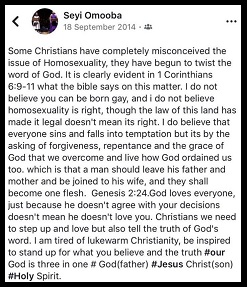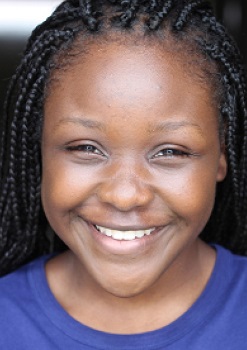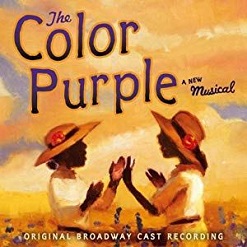
Seyi Omooba’s post on Twitter
The controversy surrounding Seyi Omooba’s comments about homosexuality and her casting as Celie in The Color Purple at Leicester’s Curve Theatre and the Birmingham Hippodrome has been big news in theatre communities worldwide the past two weeks or so. The calls for her to be removed from playing this role, one that is resonant with the LGBTQ community, have been heard and it was announced last Thursday that Omooba would no longer be playing the role. Many view this as a suitable punishment, but while it might offer a form of poetic justice, I don’t think it’s enough to constitute any kind of justice that is restorative or true.
Indeed, when the discussions around this situation focus exclusively on the removal of an actress from a role whose experience and values she doesn’t share and whether that’s right or not, I fear that we have missed the point. This situation is bigger than that. This situation is yet another example of prejudice at work in our society.
“But these are her own personal views!” people have written in objection to the reaction against Omooba. I can imagine the same thought running through people’s minds as they read this column. They’ll continue, “This isn’t hate speech. It doesn’t incite anyone to violence. Doesn’t she have the right to her own beliefs?”

Seyi Omooba
Omooba absolutely has the right to her own beliefs. This does not mean, however, that she is free from the consequences that expressing her opinion may bring, especially when what she believes helps to perpetuate a society where LGBTQ people are oppressed.
Furthermore, while Omooba’s statement isn’t a call to genocide, it lays the foundations of the pyramid of hate that leads society to atrocities of that nature. Microaggressions matter. Microaggressions lead to prejudice, discrimination and ultimately violence. And let’s face it: there is nothing indirect, subtle or unintentional about Omooba’s words about homosexuality. She’s past the stage of microaggression. Comments like hers sustain the world in which the murder of Matthew Shepard was possible. In which the assault, strangulation, torture, and burning of David Olyne was possible. In which accusations of witchcraft, imprisonment and the corrective rape of lesbian teenagers in Cameroon is possible. In which transgender people are killed in countries all over the world. In which the criminalisation of homosexuality with sentences like long-term imprisonment and death is possible.
This last description is the law of the land in Nigeria, the country from which Omooba hails.
Removing Omooba from this role doesn’t address the problem of her prejudice or the problems that prejudice like hers creates. I’m at the point in my life where I won’t support the career of people like Seyi Omooba in any way until not only an apology but also clear restitution is made the perpetuation of an oppressive worldview such as this one.

The OBCR of THE COLOR PURPLE
Saying you’re sorry isn’t enough – and let’s be clear, we haven’t even seen the most glancing of apologies from Omooba yet. There have been calls for handling Omooba gently, thus acknowledging her potential to change, but it has been reported that she was given the opportunity to retract her statement or to express any change in her views before the action of removing her from this production of The Color Purple was taken. She did neither. At this time, she has demonstrated no potential to change.
My voice might only be a single one, but my resistance is important. I can’t control this woman’s hateful views, but I can control my response to them. Maybe you’ll join me in not purchasing cast recordings on which she is featured and not supporting any production in which she is cast. Maybe you’ll join me in continuing to address her casting with the production companies that cast her. This is bigger than The Color Purple. And maybe, once Omooba has put in some work to help counteract the oppression of LGBTQ people who are trying to live lives free from discrimination, then we can consider shifting our behaviour towards her and those who support her.
Monday Meditations at Musical Cyberspace are is inspired by Shirley MacLaine’s I’m Over All That and Other Confessions. This post responds in particulate to the chapter titled “I’m Over Being Polite to People with Closed Minds.”
It’s baffling that she would want to play the role to begin with — to have anything at all to do with the show.
Thanks for taking the time to leave a comment! You’re right, there’s a something about her choices that doesn’t add up if Seyi Omooba is as principled as she presents herself to be. But looking at it from another angle, there is a clear, self-serving motivation for playing this role: it has brought both acclaim and awards to the women who have played Celie.